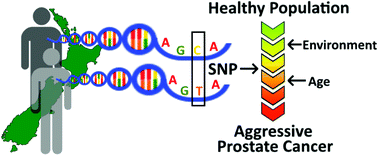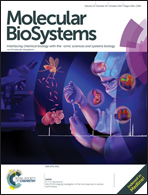Effect of ageing and single nucleotide polymorphisms associated with the risk of aggressive prostate cancer in a New Zealand population†
Abstract
Prostate cancer is one of the most significant male health concerns worldwide, and various researchers carrying out molecular diagnostics have indicated that genetic interactions with biological and behavioral factors play an important role in the overall risk and prognosis of this disease. Single nucleotide polymorphisms are increasingly becoming strong biomarker candidates to identify the susceptibility of individuals to prostate cancer. We carried out risk association of different stages of prostate cancer to a number of single nucleotide polymorphisms to identify the susceptible alleles in a New Zealand population and checked the interaction with environmental factors as well. We identified a number of single nucleotide polymorphisms to have associations specifically to the risk of prostate cancer and aggressiveness of the disease, and also certain single nucleotide polymorphisms to be vulnerable to the reported behavioral factors. We have addressed “special” environmental conditions prevalent in New Zealand, which can be used as a model for a bigger worldwide study.



 Please wait while we load your content...
Please wait while we load your content...